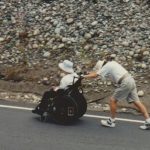
In this inspiring interview of our series “Portrait of Duchenne,” La Fondation La Force talks with Émilie Meeus, Oscar’s mother, raising funds for research into Duchenne muscular dystrophy (DMD). Émilie’s life changed when her three-year-old son Oscar was diagnosed with DMD. She decided to do something to make a difference including by starting an association to help the research. We interviewed Émilie in 2016 at Action Duchenne conference in London.
Before diagnosis
Émilie and her family live in Brussels, Belgium. Before they received the diagnosis, the family had at first to wait for the results, hoping the muscular dystrophy wouldn’t be Duchenne’s. They carried hopes and expectations based on earlier negative tests which were given by doctors.
Émilie’s family was perhaps about to learn a shattering news which would drastically change the direction of their life.
After diagnosis
Learning about the diagnosis, the family was immediately broken down knowing about the news: “As we first heart that word, that middle name word (Duchenne), all the world has really fallen apart around us.” Émilie and her family had to go through despair and through all this shocking phase facing this different reality that was involved in living with the disease. After that, things got better, and they were able to move later on: “Fortunately, daily life too over. You begin to understand that life goes on.”
An appointment with another doctor helped and encouraged them to accept the situation, to adapt and to reorganize themselves. This specific doctor simply said: “You’re going to live a different life than others, but you’re going to be happy. And the happier you’re going to be, the happier your son will be because children adapt faster and better than us.”
Once they have accepted the situation and they have been supported by professional doctors, some other things interacted and helped them move on and progress.
Watch Oscar’s full story >
To create an association
Émilie Meeus and her family wanted to create an association to raise funds and support Duchenne muscular dystrophy’s research: “We’re going to try to help the research and treat the disease. And, even if we fail it, we’re going to give him the best possible life.” So, besides allowing them to stay well-informed about the disease and its latest developments and so for the progress of the research, they’ve been able to expand their social circles, talk with other people suffering from the same disease and listen to their experiences. Their approach allowed them to stay positive and hold on the hope of living a happy life.
Reorganisation and life changes
In the final stages of their adaptation process, Émilie and her family had to accept the imposed limits of the disease to allow them finding satisfaction and joy again despite all the difficulties encountered. For instance, their special condition may include positive aspects such as living way more in the present moment: “Perhaps, we enjoy more daily life than others. Maybe it’s that we project ourselves less into the future. I’ve always tended to try looking far ahead. As for now, I do it less because you can never know… Still, it helps me enjoy whatever day holds, it really does.”
To broach the subject with children
Émilie found a simple way to broach the DMD disease with her son Oscar comparing it as a “leg’s boo-boo.” Since children are too young to understand all the details of the disease, at least, it allows them to acknowledge their medical situation and recognize it on other people suffering from the same disease: ” When we met another family, we explained to Oscar that we would see a little boy having the same leg’s boo-boo as him.”
Until Oscar is old enough to understand his medical situation, he’s for now able to figure it out through images and simplification with the help of his family.
DMD changes your life in a split second
The progression of DMD is unforgiving: the body’s muscles gradually weaken, leaving children with DMD in a wheelchair by age 12. They have a life expectancy of 20 to 30 years. There is no cure and, in Canada, no treatment for the cause. Two treatments for DMD are approved in the USA and Europe, but they don’t benefit all children with DMD. Promising treatments, in development, are expected within 5 to 10 years.
Emilie’s foundation > Little O against DMD
Acknowledgements
We thank Action Duchenne, who received us with open arms to conduct a series of interviews.

To receive the next interview in our series “Portrait of Duchenne,” please subscribe to our newsletter.



